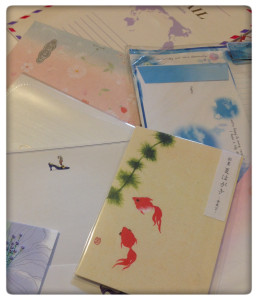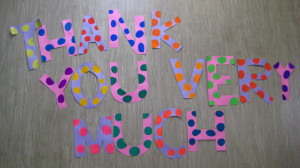Kitcher’s Café, a new series by Lana Kitcher (Yamanashi-ken, 2010-12) is an assortment of articles, topics and commentary written for the JET Alumni community. Lana currently serves as the Business Development Associate at Bridges to Japan, a New York-based cross-cultural consulting firm founded by JET alum Jennifer Jakubowski (Hokkaido, 1995-97).
Although it has been a full year since my return, I continue to enjoy sharing stories and experiences with my friends from and in Japan. Recently, one of my old colleagues from Yamanashi visited New York for the first time and contacted me through facebook to meet up. I took her and her travel partner to "Penelope," a small restaurant on E 30th and Lexington Ave in New York. I was pleasantly surprised to see facebook photos of them going there for breakfast every day thereafter for the duration of their trip. It was a great and satisfying feeling to make these arrangements with her and be able to see the results.
As you are settling into a familiar state, maybe even feeling like your time in Japan was actually all a dream – you may wonder how it might be possible to keep up with your friends and colleagues that you met while in Japan. Thanks to social media, staying in touch has never been easier.
Sites like facebook and twitter, as well as new apps and technology such as Line or Skype, are perfect for keeping in touch with friends and maintaining connections over long distances. One site to consider is "Mixi," a Japanese networking site similar to "MySpace." According to The Japan Times Life section, Yahoo! Japan/Kakao Talk, Comm, Gree, and Mobage are also popular and commonly used in Japan. Although LinkedIn is not widely known in there yet, it is another option when trying to keep in touch with your professional contacts from abroad.
Along with social media networking, I would recommend keeping a list of names, e-mail addresses, phone numbers, and how you are connected to each person (in case you start to forget), and make an effort to occasionally reach out to the amazing people that you met along the way. You never know – perhaps you will need a recommendation for your Masters or PhD program. Maybe someone will be visiting your region and will want to reach out to you. It is even possible that someday you’ll go back to Japan to visit and want to reconnect with the individuals that made your time there special.
Another form of communication that many underutilize (in my opinion) is "snail-mail." Why not consider sending letters back and forth to Japan, making it a special activity? Mark Vanhoenacker recently wrote an excellent article in The New York Times OpEd section, making many points I agreed with about the value in writing letters by hand entitled “Dear Emma." Personally, I have had pen pals off and on since elementary school, the old fashioned way, and continue to value this method of communication highly over using computers. "A pen pal was a window into the world's endless collisions of similarity and difference," Vanhoenacker states. "Some things remain more valuable simply because they are hard to do... When I received a letter I would treasure it for hours, waiting for the right moment on the porch or by the fireplace to unseal what had traveled across seas, the Pacific, a week, or more of my life."
In addition to agreeing with Vanhoenacker’s argument, here are a few extra points for letter writing:
Why I Love Snail Mail
1) I adore stationery, especially the kind available in Japan. Luckily I can still get my fix at Kinokuniya, a Japanese bookstore.
2) The act of writing soothes me, and it feels like a special activity. I turn on some mood music, light a candle or two and make it a quiet time for reflection. My work requires me to be online and at the computer for most of the day, and getting away from that is a welcome change of pace.
3) Letters take time to be delivered. We live in an “instant gratification” era, but this can put us on overload. When I send letters to Japan, I enjoy the time between sending the letter and waiting for a response. For me, that beats sending and receiving hundreds of texts, e-mails, tweets, messages, pokes, tags, AGH!
4) I love opening the mailbox and there it is… a letter! Not a bill, not some junk mail, but a letter. And it’s addressed to me! I'm always so excited to go to the mailbox, an action that many only think about when they're expecting birthday checks or a shipment from Amazon.
5) I get to practice my seldom-used penmanship, and feel as though I'm offered a window into the other person's personality through theirs as well.
6) Sometimes a trip to the nearest postbox is a good reason/excuse to get out of the house and take a walk.
7) Although stamps are becoming more expensive, I still enjoy choosing the different kinds and seeing the new designs. Plus, stamps don't become collectible/valuable until they've been postmarked.
8) It's more personal than an e-mail. The person on the other end spent time, thought, and energy to write to me and I appreciate that. I know I have a good relationship with the people I write with, and that it will be a long-lasting one.
9) Although the government has the right to read material of question that goes through the mail, it still feels more private and intimate. If my letter gets hacked (aka opened), I won't lose my address book or passwords.
10) I feel like a completely real, open, and better version of myself when I write by hand. The words are a direct connection from my brain through my body, printed onto a physical piece of paper. I've noticed myself saying things that are out of character with technology because it doesn't feel real and I rush the interaction. Writing forces us to take off the mask and be who we are.
What ways have you found to stay in touch with your friends in Japan? What do you like or dislike about writing letters? Please feel free to share your questions, comments, opinions and experiences with readers in the comment section below.

